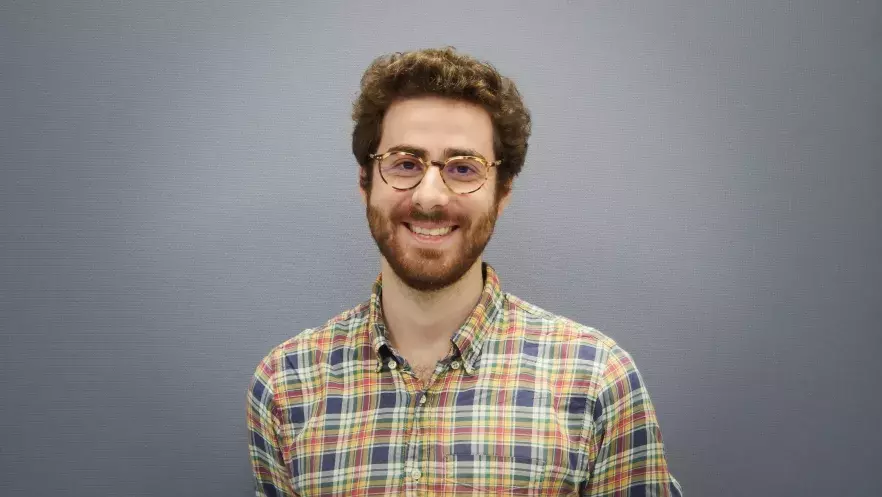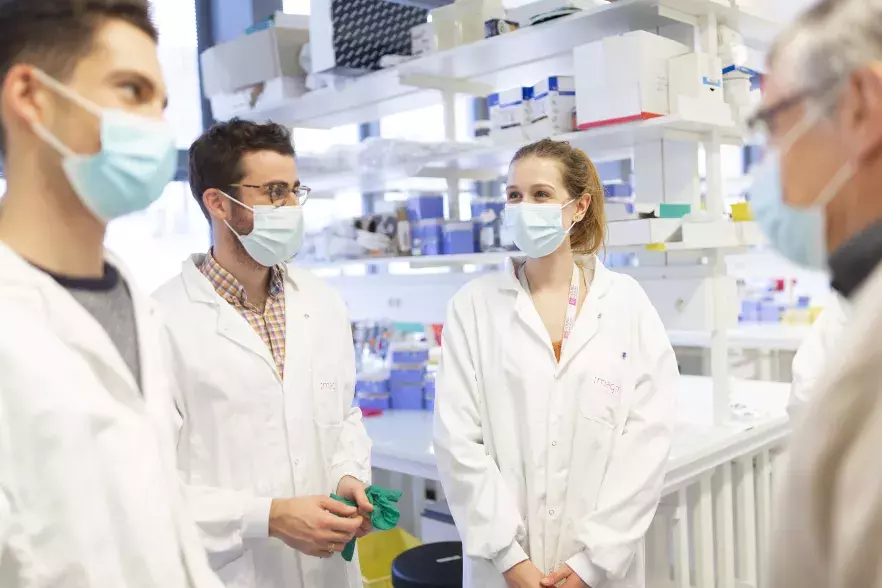Published on
In March 2020, when the country is at a standstill and plunged into uncertainty, Paul Bastard rides his bicycle through the deserted streets of Paris and its suburbs. With a special derogation in his pocket, he travels from hospital to hospital - Pitié-Salpêtrière, Tenon, Foch, Bondy, Robert Debré - to collect blood samples from patients who have contracted a severe form of Covid-19. The objective? To identify the genetic and immunological causes of these severe forms by analysing the genetic material in the blood and the composition of the plasma.
It's a great reward for me but I think it's also a collective recognition
Two years later, Paul published a series of major papers on Covid as first author (1,2) and successfully defended his science thesis. The icing on the cake : on 24 February he was awarded the prestigious Michelson Philanthropies & Science Prize for Immunology, which is awarded to a young researcher for innovative and impactful work in medicine and research. To mark the occasion, a column in the journal Science is devoted to him, with a text written by him entitled "Why do people die from Covid?" in which he recounts the genesis, the challenges and the prospects of his discoveries on the causes of severe forms of Covid. The story he tells echoes his own journey, which began with a decisive choice: temporarily suspending his final year of medical school to start a Master's degree in the New York branch of the Genetics of Infectious Diseases Laboratory, directed by Jean-Laurent Casanova.
In the wake of this, in 2018, he benefited from the MD-PhD programme supported by the Bettencourt Schueller Foundation, and began a thesis at the Imagine Institute. Initially, his research focused on severe viral infections with Shen-Ying Zhang, in particular herpes virus (HSV1) infections of the brain, which in rare cases lead to herpes encephalitis. His project is to understand the causes of these rare forms. "While conducting a genetic analysis, I discovered in a patient with herpes encephalitis a genetic defect in the type 1 interferon receptor (IFNAR1), a molecule whose main function is to block viruses as soon as they enter the body."
As soon as the health crisis began, he changed his focus and concentrated on the Sars-Cov-2 virus. A question that plagued the global scientific community was how to explain the very great heterogeneity observed between individuals in the immune response to this virus. Paul Bastard took up this question, which has been the leitmotif of the human genetics of infectious diseases laboratory for more than twenty years for a multitude of other infectious agents. These investigations led team to find this same genetic defect in the IFNAR1 receptor in certain patients with severe forms of the disease, and other mutations in genes in the pathway of type I interferon. And this is just the beginning. "With Emmanuelle Jouanguy and Lucy Bizien in Paris, Qian Zhang in New-York, and all the lab team, we had kept the plasma from samples we received from various hospitals and had the idea of measuring the patients' autoantibodies. By chance, I discovered an abnormal presence of autoantibodies neutralising the antiviral action of type 1 interferons in several samples, ". But as Pasteur said, luck only favours the well-prepared. So it was necessary to confirm this observation by analysing more samples.
This did not take long to happen. In February 2020, Jean-Laurent Casanova, co-director of the laboratory with Laurent Abel, created a consortium with the N.I.H. (the American National Health Agency) called COVID-HGE, aimed at recruiting a large number of patients with severe and moderate forms of the disease. Today, more than 400 centres around the world send their blood samples or sequence the patients' DNA themselves and test for autoantibodies. "Thanks to this consortium, we were able to show from several thousand samples that 10% of patients with severe pneumonia had these anti-antibodies in very large quantities: 100 to 1000 times the physiological dose! Since then, we have improved our techniques and we have realised that it is closer to 15%. We still think that this figure is underestimated, that there are more but that they cannot be detected".
In simple words, at least 15% of severe forms of Covid can be explained by the presence of these autoantibodies, 20% if we add genetics forms. This discovery represents a major advance in the understanding of the disease, with direct implications for the prevention and treatment of patients with this immunological defect.
By looking at the profile of patients and testing more than 34,000 individuals from the general population, Paul and his colleagues (including 4 other PhD students: Adrian Gervais, Tom Le Voyer, Jérémie Rosain and Quentin Philippot, as well as Aurélie Cobat, Jérémy Manry and Anne Puel) also discovered that the quantity of these autoantibodies increases almost exponentially with age, which partly explains why older people are more at risk of developing severe forms. "However, we still don't know why or how to explain the remaining 80% of severe forms," Paul warns. Research is therefore continuing in this area.
Today, Paul is resuming his final year of medicine in the paediatric intensive care unit at the Hôpital Necker-Enfants Malades and still has one foot in the laboratory. For him, this prize is an opportunity to contribute to making this research known and undoubtedly a springboard for starting new collaborations. "It's a great reward for me," he admits, "but I think it's also a collective recognition: I'm not alone. There is a huge team behind me that has worked on autoantibodies." A thought in Paul's image: humble and altruistic


